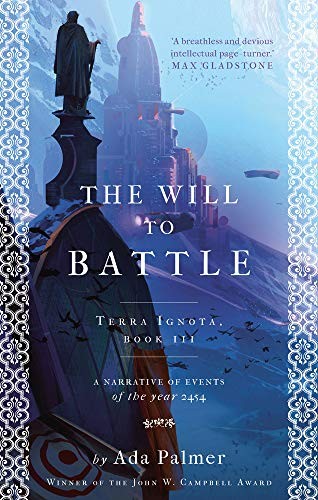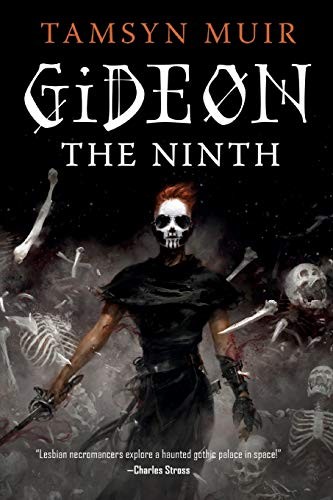stuebinm started reading Jacques le Fataliste et son maître by Denis Diderot

Jacques le Fataliste et son maître by Denis Diderot
Jacques the Fatalist and his Master (French: Jacques le fataliste et son maître) is a novel by Denis Diderot, written …
This link opens in a pop-up window

Jacques the Fatalist and his Master (French: Jacques le fataliste et son maître) is a novel by Denis Diderot, written …

"The long years of near-utopia have come to an abrupt end. Peace and order are now figments of the past. …

"The long years of near-utopia have come to an abrupt end. Peace and order are now figments of the past. …
i think i'm too overwhelmed to really write anything about this book rn, it's too much. spätestens ab der hälfte war ich auch nicht mehr wirklich ausreichend aufnahmefähig (there is so, so much going on in this text, and my memory not nearly good enough to keep all strands in my head at once)
i think i'm too overwhelmed to really write anything about this book rn, it's too much. spätestens ab der hälfte war ich auch nicht mehr wirklich ausreichend aufnahmefähig (there is so, so much going on in this text, and my memory not nearly good enough to keep all strands in my head at once)

"The Emperor needs necromancers.
The Ninth Necromancer needs a swordswoman.
Gideon has a sword, some dirty magazines, and …
that whole bit about the legally untranslatable latin dialogue, except one of the people present also speaks unreasonably obscure latin nobody else is used to, so the narrator reasons it's fine to at least give translations in 'normal' (in-world modern) latin, and then his anonymous editor suddenly inserts a paragraph saying "oh yeah i translated the latin but i suck at it & did so in secret from the others, so not sure how accurate it is" is still so absurdly over-the-top funny to me (all three versions are in the text, so one can compare)
even better since the editor clearly attempted to translate the obscure version of everything, not the narrator's "reasonable" gloss, so there's lots of overly-literal translations of idioms and such
also the latin speakers exchange a couple sentences beetween them in english without putting in much effort, so the grammar leaks and everyone …
that whole bit about the legally untranslatable latin dialogue, except one of the people present also speaks unreasonably obscure latin nobody else is used to, so the narrator reasons it's fine to at least give translations in 'normal' (in-world modern) latin, and then his anonymous editor suddenly inserts a paragraph saying "oh yeah i translated the latin but i suck at it & did so in secret from the others, so not sure how accurate it is" is still so absurdly over-the-top funny to me (all three versions are in the text, so one can compare)
even better since the editor clearly attempted to translate the obscure version of everything, not the narrator's "reasonable" gloss, so there's lots of overly-literal translations of idioms and such
also the latin speakers exchange a couple sentences beetween them in english without putting in much effort, so the grammar leaks and everyone else is left confused
it is just so much
found this lying around on the street & thought it might be interesting
(admittedly, the absurd narrative speed evens out a bit in the later books; i guess there's a reason why it's the first one that she called 'too like the lightning [which doth cease to be, ere one can say, it lightens]')
(admittedly, the absurd narrative speed evens out a bit in the later books; i guess there's a reason why it's the first one that she called 'too like the lightning [which doth cease to be, ere one can say, it lightens]')
annoyingly, this book is still in the category of "almost everything i could possibly say about it has at least essay-length", and i don't have the time or motivation to write essays 🙈
a fun side observation tho: it moves slowly, not in the sense that i'm on page 155 and it's barely evening of the second day described, but in that reappearing characters usually reappear exactly where they were left before the narration switched focus on someplace else, and there are absolutely no "they did $things in the meantime"-passages anywhere — everything is part of the main trunk of the narration grinding along at dizzying (but slow) speeds, without ever taking a moment for breath (while Mycroft repeatedly hits you on the head with the entire canon of 'western' philosophy, and being unnecessarily horny about it all)
annoyingly, this book is still in the category of "almost everything i could possibly say about it has at least essay-length", and i don't have the time or motivation to write essays 🙈
a fun side observation tho: it moves slowly, not in the sense that i'm on page 155 and it's barely evening of the second day described, but in that reappearing characters usually reappear exactly where they were left before the narration switched focus on someplace else, and there are absolutely no "they did $things in the meantime"-passages anywhere — everything is part of the main trunk of the narration grinding along at dizzying (but slow) speeds, without ever taking a moment for breath (while Mycroft repeatedly hits you on the head with the entire canon of 'western' philosophy, and being unnecessarily horny about it all)
Haven't read much so far, but god have i missed Mycroft's voice, he's so absurdly, obnoxiously, incomprehensibly derangend in absolutely every word he writes; i keep having fun imagining what one of his actual readers would think, since he's explicitly writing this for publication soon after the events he's describing
(i'm kinda anxious about how much i like i'll like these books this time overall though — been years since i read this, and i might disagree with Ada more now than I did before, but we'll see)
Haven't read much so far, but god have i missed Mycroft's voice, he's so absurdly, obnoxiously, incomprehensibly derangend in absolutely every word he writes; i keep having fun imagining what one of his actual readers would think, since he's explicitly writing this for publication soon after the events he's describing
(i'm kinda anxious about how much i like i'll like these books this time overall though — been years since i read this, and i might disagree with Ada more now than I did before, but we'll see)